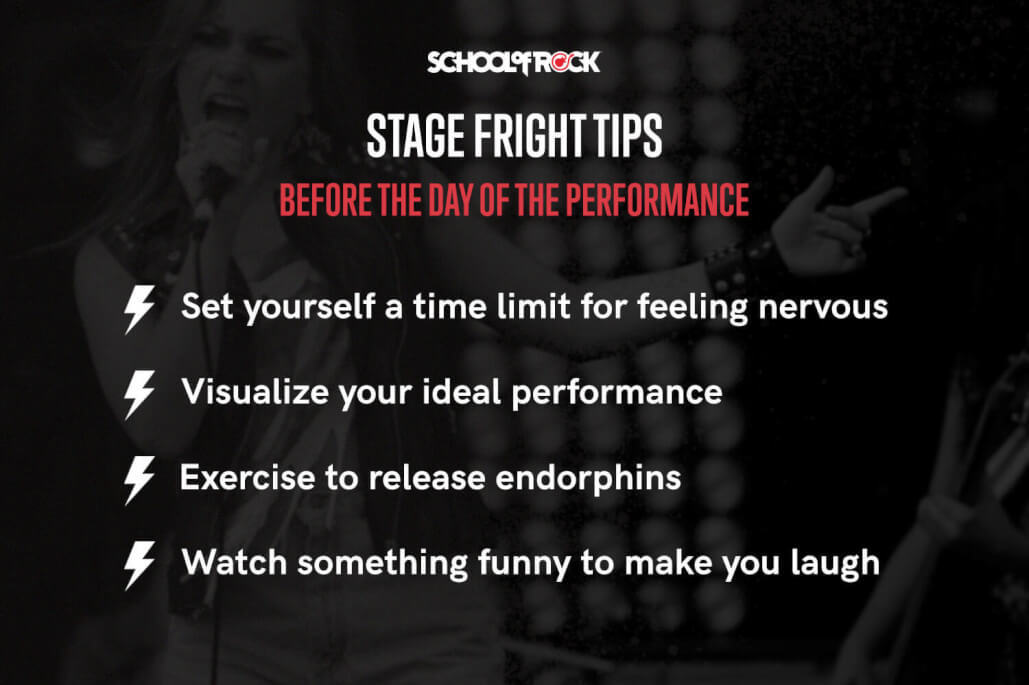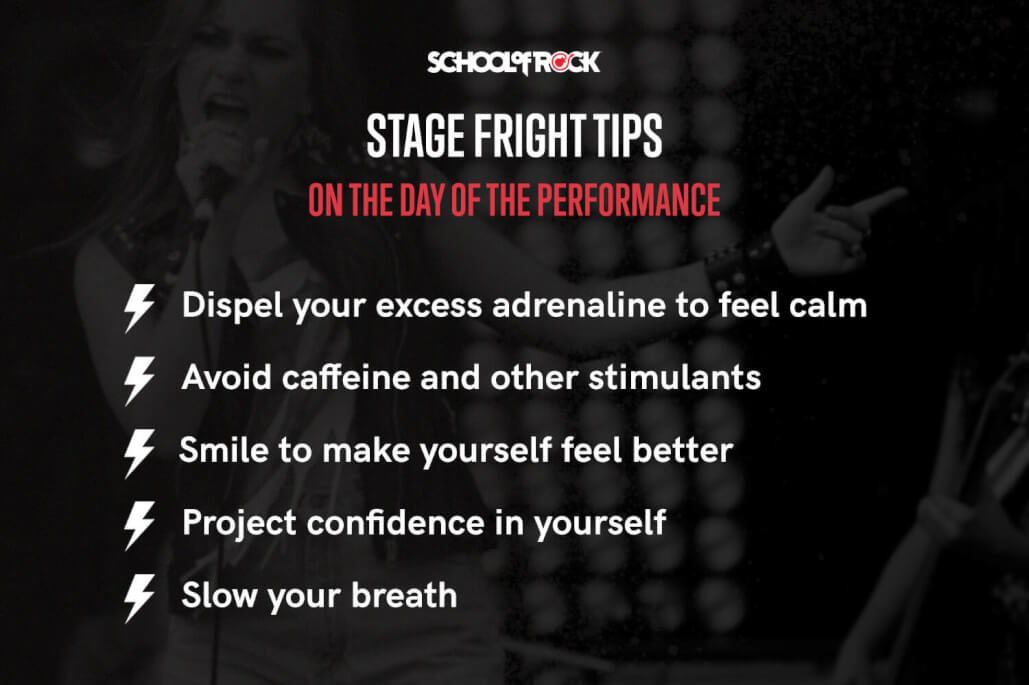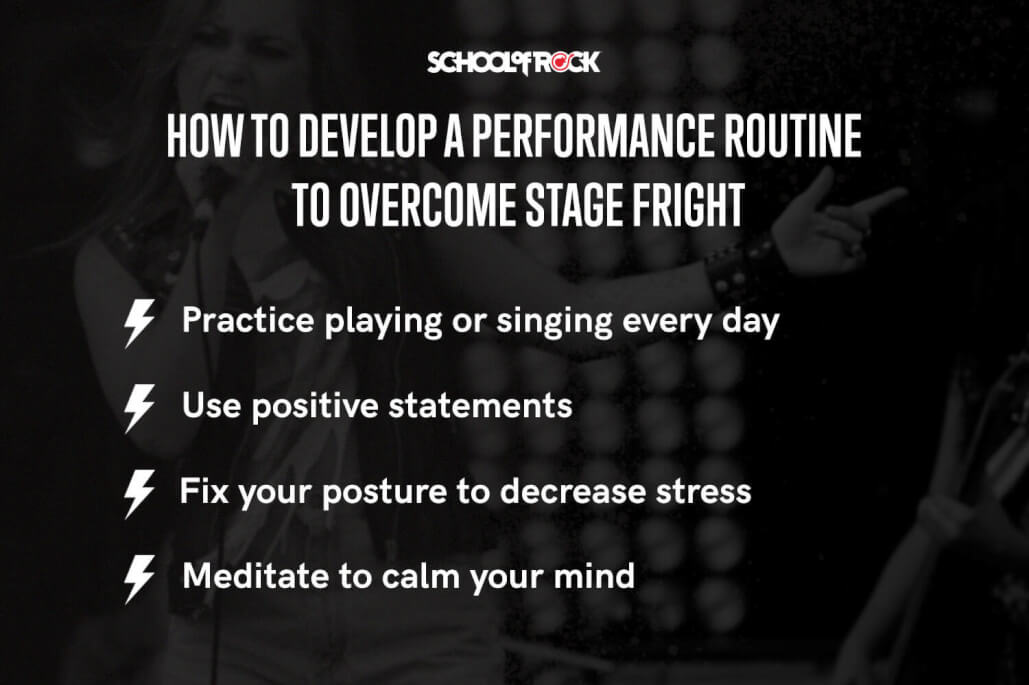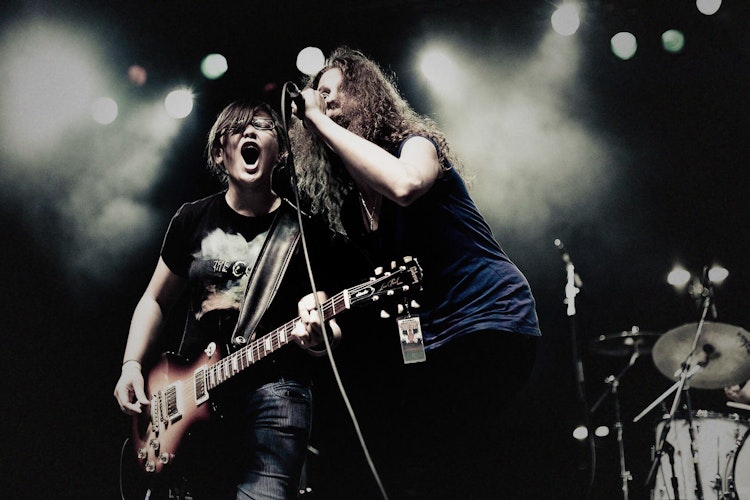The house manager pokes her head backstage. “You guys ready? You’ve got a great crowd tonight.” You clutch your guitar to your chest and nod. Except you don’t feel ready. You feel like running away.
Or maybe you’re finally auditioning for The Voice. You’ve waited patiently in line for hours, and you’re next up. Only a minute ago, you were as cool as the proverbial cucumber, but now your breathing is speeding up, your heart is thumping, your stomach is churning and your palms are beginning to sweat. You feel a bit dizzy, and your legs are going numb. What’s going on?
You’ve got stage fright, also known as performance anxiety. And if you’re a musician—whether an instrumentalist or singer—you should know how to overcome stage fright so that if it ever strikes, you’ll be ready.
What Is Stage Fright?
So what is stage fright, exactly? Stage fright is a form of anxiety, and like most anxieties, it’s about your brain and body mistakenly believing that you’re in danger. Humans have evolved to be really good at fighting or running away from things that might hurt us. But even when there’s no actual threat, when you get scared, your body wants to fight, flee, or freeze—and that can get in the way of all sorts of things, including performing.
How to Overcome Stage Fright
The first (and maybe the most important) step to overcoming stage fright is to let yourself off the hook. It’s not a rare experience, and you’re not unusual for getting pre-show jitters. John Lennon, for example, was famous for throwing up before he went on stage.
Adele once ran down a fire escape rather than perform. Eddie Van Halen, Ozzy Osbourne, Rod Stewart, Carly Simon, Rihanna, Katy Perry… the list of famous, successful musicians who have had to navigate and overcome stage fright to do what they love is very long indeed. You’re not alone. So now that you know you’re in excellent company, here are practical tips for how to overcome stage fright.

How to Get Over Stage Fright Before the Day of Performance
- Set yourself a time limit for feeling nervous.
It’s normal to feel anxious before a performance, but the longer you let yourself freak out, the more anxious you’ll grow. Give yourself a short amount of time to feel nervous—set a timer so you don’t go over—and then move on and do something active like drink some tea or warm up your voice and body. - Visualize your ideal performance.
Close your eyes and imagine yourself performing. You’re hitting every note, connecting with every audience member. These kinds of positive visualizations not only help you feel calm but also set you up for success. Your brain is extraordinarily powerful. Make it work for you. - Exercise to release endorphins.
If you’re a performer, you’re probably exercising regularly anyway, so don’t let your routine slip on the day of a concert. You need those endorphins. Get to the gym, go for a run, take a dance class—whatever works best for you. Exercise is one of the best anxiety-management tools out there. Just don’t overdo it and wear yourself out. Save some energy for the show. - Watch something funny to make you laugh.
Watch YouTube videos of puppies romping in deep snow. Or exchange texts with a friend who always makes you laugh. Laughter produces endorphins (like exercise, see above), and endorphins counteract feelings of anxiety.

How to Overcome Stage Fright for the Day of Performance How to Overcome Stage Fright for the Day of Performance
- Dispel your excess adrenaline to feel calm.
When you’re anxious, your body is filled with adrenaline, so use it. Jump up and down. Shake out your limbs one by one. Jog in place. Even a little bit of movement will help you feel calmer. - Slow your breath.
You naturally breathe faster when you’re in fight-or-flight mode, so forcing yourself to breathe more slowly and deeply can convince your body that you’re not in danger. Breathe in, and then breathe out through pursed lips. Set up a rhythm where your out-breath lasts twice as long as your in-breath as this is naturally soothing to your nervous system. - Avoid caffeine and other stimulants.
Before an audition or concert, your body is flooded with adrenaline. There’s no need to charge yourself up any further. In fact, too much caffeine (like that third cup of coffee) can actually cause you to feel anxious, so sip some herbal tea, and save the latte for later. - Smile to make yourself feel better.
Even if you don’t feel like smiling, do it. Forcing your face to smile (crinkling your eyes, letting your smile puff out your cheeks, the whole nine yards) can actually make you feel happier and calmer because your brain figures that if you’re smiling, you must be happy. The brain-body connection goes both ways. - Project confidence in yourself.
Don’t run around telling everyone how nervous you are. This will deepen your anxiety, and you can easily spread your nerves to everyone else. Tell yourself and your bandmates that everything is great, that you’re all going to kill it tonight, that the audience is going to be enraptured.
Bonus tip:
Do your warm-up routine again. If you’re a singer, run through your lip rolls and tongue trills. If you’re an instrumentalist, do some scales or finger exercises. This kind of familiar ritual will come automatically. Doing it will remind you of everything you’ve done to get to where you are. You’ll feel more like yourself, and that will set you up to perform your best.

Develop a Performance Routine to Overcome any Stage Fright
- Practice playing or singing every day.
The more prepared you are, the less nervous you’ll be. Practice gives you confidence, and the repetition provides your body with sense memories to rely on, even when your brain is feeling frozen. In fact, School of Rock instructors recommend practicing for at least 30 minutes every day.
Vocalists—understanding your vocal range helps you stay in your comfort zone! Discover your vocal range and focus on your strengths.
For pianists, mastering chords is essential for a confident performance. Learn the basics with our guide to piano chords for beginners. Remember: regular practice will help you develop muscle memory and reduce stage fright. - Use positive statements.
Reassure yourself. This is not the time to let your inner critic run rampant. Stick that unhelpful voice in a soundproof box, and tell yourself that you’re going to be fine, that your voice will sound beautiful, that you’re strong and capable. Give yourself the pep talk that you would give your best friend. - Fix your posture to decrease stress.
On that same note, don’t let your brain tell your body to slump, sink your head into your shoulders or fidget. Stand up straight, lengthen your neck and let your arms hang loosely. Fixing your posture can actually convince your brain that there’s nothing to worry about. Stand like the superhero you are. - Meditate to calm your mind.
You can meditate right before you go on or even hours before a performance. Regular meditation teaches you to move past your immediate emotions and connect with a calmer and wiser part of yourself.
Other Tips on How to Get Over Stage Fright
ACCEPT YOUR ANXIETY AND MANAGE YOUR STRESS
Tell yourself that it’s fine to be nervous, and then start working that stress out of your system. Try clenching and releasing your muscles, starting at your toes and working up.
Create a Pre-Show Routine
Creating a pre-show routine can help calm your nerves. For drummers, this might include setting up your kit in a way that feels comfortable and familiar. Learn how to set up your drums to get ready to perform.
Guitarists and bassists can make sure their instruments are ready too by making sure they are tuned properly.
TALK TO A PROFESSIONAL
If your performance anxiety is particularly severe, talking to a therapist can be helpful indeed. It might also be worth sharing your nerves with your music coach if you think they might become a problem. They might have suggestions that will help—and they can reassure you because they know firsthand just how hard you’ve been working. If you’d like more information, you can find a great list of additional organizations and resources from the American Psychiatric Association.
One last thought: a little bit of stage fright is actually a good thing. If you channel that extra adrenaline and excitement into your performance, you’ll find that you hit new highs of passion and energy. And that can be very exciting for you and your audience. Figuring out how to overcome stage fright isn’t easy, but with the proper tools, you can shine onstage like the star you were meant to be.
"One last thought: a little bit of stage fright is actually a good thing."
What Are the Causes of Stage Fright?
There are many potential causes of stage fright, and these will differ from person to person. Some people are more susceptible to performance anxiety, but it’s important to remember that no one is immune, not even the most seasoned musicians. Even if you’ve never had stage fright before, chances are that one day, you will feel a flutter in your stomach or hear an unfamiliar—and unwelcome—quaver in your voice. So what might be setting off your performance anxiety?
Recognizing the causes of stage fright can help you focus on beating it. Common causes include:
- Lack of preparation. Let’s face it. If you’re not sure you know the words to your song or you’re worried you might make a mistake in the opening bass riff, you’re going to be nervous—and that naturally predisposes you to stage fright. Luckily, this is one factor that is well within your control. The answer? Practice, practice, practice.
- Lack of experience. While anyone can get stage fright, the less experienced you are, the more likely you are to have performance anxiety because you have fewer memories of successful performances to fall back on. You have less evidence that there is truthfully nothing to be afraid of, so just keep going. It will definitely get easier.
- Fear of failure. There’s no avoiding the truth that getting up in front of an audience is risky, partly because there is always a chance you might hit a wrong note—and that people will be there to witness your slip-up. Of course, those same people are there to witness your far-more-likely triumph, so focus on that possibility instead.
- Pre-existing anxiety. Some people are just born anxious. It’s hardwired into their brain chemistry. If this is you, in an odd way, you’re lucky because chances are you’ve already had to learn to manage your anxiety in other situations, and you can apply those same techniques here.
- High stakes. The more important a performance, concert or audition is, the more likely you are to feel anxious. But it’s important to keep things in perspective. Your body might think this is a life-or-death moment, but that’s almost certainly not true. The stakes might be high, but they’re not that high, so take heart.
Stage fright "phobia"
There’s even a fun word for the stage fright “phobia”: glossophobia. Technically, it means “a fear of public speaking,” but it can be applied to all public appearances, including musical performances.
Stage Fright Symptoms
Since stage fright is essentially an attack of acute anxiety, the symptoms of stage fright can make you feel like you’re in danger. Your heart starts beating rapidly, pulling blood away from your hands and feet. Adrenaline, noradrenaline and cortisol flood your system, making you jittery, nauseated and even dizzy. You’ll breathe more quickly as your body prepares to run away or fight the danger it thinks you’re about to face. Your mouth goes dry because your body directs resources away from digestion and toward survival.
Here are some stage fright symptoms:
- Rapid heartbeat
- Narrowed vision
- Dry mouth
- Tight throat
- Trembling or shaking
- Nausea
- Sweaty hands or feet
- Cold extremities
Having stage fright doesn’t mean you’re not meant to perform or that you’re not good at what you do. With practice, you can learn to manage your stage fright symptoms, and after a while, you might notice that your performance anxiety is less acute or that it strikes less frequently. In the meantime, be proud that you’re facing your fears. That courage will shine through when you’re making the music you love, and your audience will love you for it.






